Yesterday I made a simulation using Python. I had a few difficulties with variables and debugging.
Is there any software for Python, which provides a decent debugger?
Related question: What is the best way to debug my Python code?
Yesterday I made a simulation using Python. I had a few difficulties with variables and debugging.
Is there any software for Python, which provides a decent debugger?
Related question: What is the best way to debug my Python code?
Don't forget about post-mortem debugging! After an exception is thrown, the stack frame with all of the locals is contained within sys.last_traceback. You can do pdb.pm() to go to the stack frame where the exception was thrown then p(retty)p(rint) the locals().
Here is a function that uses this information to extract the local variables from the stack.
def findlocals(search, startframe=None, trace=False):
from pprint import pprint
import inspect, pdb
startframe = startframe or sys.last_traceback
frames = inspect.getinnerframes(startframe)
frame = [tb for (tb, _, lineno, fname, _, _) in frames
if search in (lineno, fname)][0]
if trace:
pprint(frame.f_locals)
pdb.set_trace(frame)
return frame.f_locals
Usage:
>>> def screwyFunc():
a = 0
return 2/a
>>> screwyFunc()
Traceback (most recent call last):
File "<pyshell#62>", line 1, in <module>
screwyFunc()
File "<pyshell#55>", line 3, in screwyFunc
return 2/a
ZeroDivisionError: integer division or modulo by zero
>>> findlocals('screwyFunc')
{'a': 0}
Winpdb (archived link / SourceForge.net / Google Code Archive) is a platform independent graphical GPL Python debugger with support for remote debugging over a network, multiple threads, namespace modification, embedded debugging, encrypted communication and is up to 20 times faster than pdb.
Features:
Alternative: Fork of the official winpdb (winpdb-reborn · PyPI / GitHub)
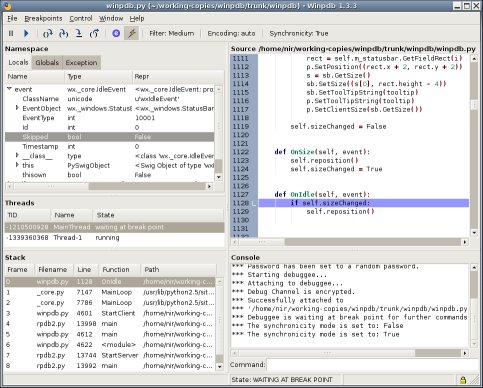
(source: winpdb.org)
pudb is a visual debugger for python.

python -m pudb script.py and you are debugging the code without modifying it –
Saporous Don't forget about post-mortem debugging! After an exception is thrown, the stack frame with all of the locals is contained within sys.last_traceback. You can do pdb.pm() to go to the stack frame where the exception was thrown then p(retty)p(rint) the locals().
Here is a function that uses this information to extract the local variables from the stack.
def findlocals(search, startframe=None, trace=False):
from pprint import pprint
import inspect, pdb
startframe = startframe or sys.last_traceback
frames = inspect.getinnerframes(startframe)
frame = [tb for (tb, _, lineno, fname, _, _) in frames
if search in (lineno, fname)][0]
if trace:
pprint(frame.f_locals)
pdb.set_trace(frame)
return frame.f_locals
Usage:
>>> def screwyFunc():
a = 0
return 2/a
>>> screwyFunc()
Traceback (most recent call last):
File "<pyshell#62>", line 1, in <module>
screwyFunc()
File "<pyshell#55>", line 3, in screwyFunc
return 2/a
ZeroDivisionError: integer division or modulo by zero
>>> findlocals('screwyFunc')
{'a': 0}
As the post suggested, there are a few options:
pdb: Python's built-in debugger
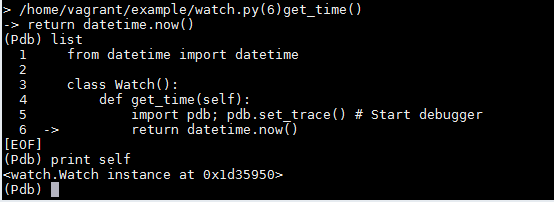
(source: cachefly.net)
pudb: GUI debugger
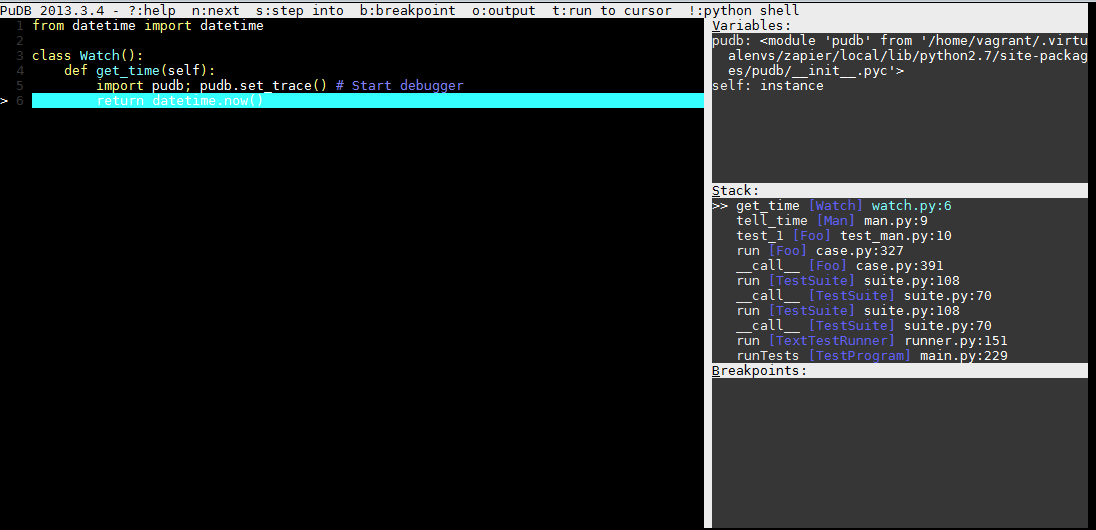
(source: cachefly.net)
pydbgr: a rewrite of the pydb debugger
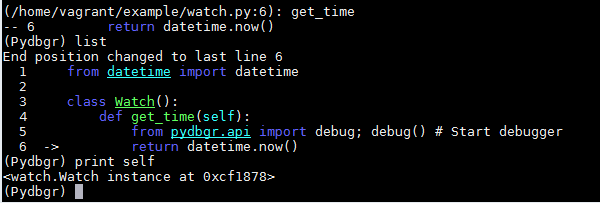
(source: cachefly.net)
ipdb: iPython's ipdb
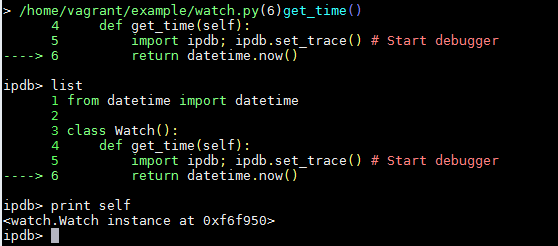
(source: cachefly.net)
You can check out the python debugger pdb, which is included in the standard library: http://docs.python.org/library/pdb.html
I'd recommend pydb and ipython for interactive debugging.
Both have screencasts available at showmedo.com
Komodo IDE (not the free Komodo Edit) comes with a debugger. I haven't used it in over a year, but it was good back then (v 3, IIRC).
I used PyCharm and WingIDE for debugging, both are great.
PyCharm uses quite some RAM (it's in Java), still, I ended up using it as I can debug doctests that I'm executing from it.
WindIDE is written in Python, I like it more than PyCharm except for the lack of running doctests.
You can also try Spyder, which I never succeeded to make work.
See official Python wiki for suggestions. Feel free to update and subscribe to receive notifications when something new comes out.
© 2022 - 2024 — McMap. All rights reserved.